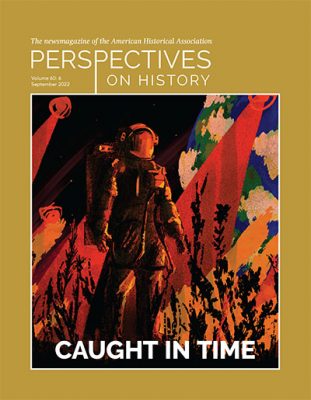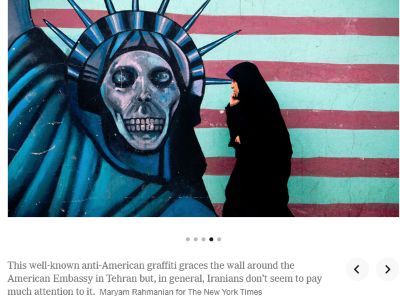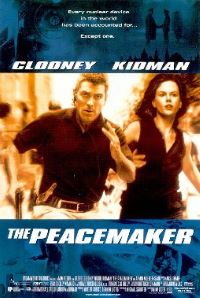
The apology by the American Historian Association President arrived online before the print version from the September newsletter did. It has been a couple of years since a history organization endured a culture wars controversy of its own making:
SHEAR CHAOS: A Culture Wars Train Wreck for a History Organization (8/19/20).
SHEAR, the Society for Historians of the Early Republic, made the front page of the arts section of The New York Times then. The incident involved an on-line presentation at the annual conference about Andrew Jackson. According to the NYT:
[I]t set off a firestorm that led within 72 hours, to set off the ouster of the group’s president, as well as the publication of open letters denouncing the talk and counterletters protesting the ouster. It also caused debate over whether the distinguished academics society was experiencing an overdue reckoning with racism or abandoning its commitment to robust scholarly debate in the face of a Twitter mob.
Almost the same words could be written this time around. To be fair, the presidential position in historical organizations often are one-year positions with the new officers elected at the annual conference.
This time around, the President’s message generate not one but two op-ed pieces by the newspaper’s columnists. So what is going on?
IS HISTORY HISTORY? IDENTITY POLITICS AND THE TELEOLOGIES OF THE PRESENT
President James Sweet began his column in the summer newsletter by citing a warning from twenty years ago against “presentism.” The warning was a two-fold one:
1. a declining interest among historians for topics prior to the 20th century
2. an increasing tendency to interpret the past through the lens of the present.
The warning from the past said historians would be better served by taking degrees in sociology, political science, or ethnic studies if history meant short-term identity politics defined by present concerns.
According to Sweet, the discipline did not heed the warning. Doctorates for post-1800 topics increased while pre-1800 doctorates decline. Undergraduate enrollments in history courses also declined. The focus became more and more narrowly focused on the 20th and 21st centuries, practically current events one might add.
Our interpretations of the recent past collapse into the familiar terms of contemporary debates, leaving little room, for innovative, counterintuitive interpretations.
Sweet then posed a provocative question.
If we don’t read the past through the prism of contemporary social justice issues — race, gender, sexuality, nationality, capitalism — are we doing history that matters?
In other words, if one is not attacking white male heterosexuals, is one doing history? That may seem like a distorted oversimplification but examine the presentations at a history conference and see how many do that.
Sweet uses a trip to Ghana this past summer to illustrate the presentism point. He was there for work tasked with writing a critical response to The 1619 Project: A New Origin Story for a forthcoming forum in the American Historical Review, the academic journal of the AHA. When I was writing my blogs on the SHEAR forum on David McCullough’s The Pioneers, I wondered if The 1619 Project would receive the same scrutiny from the history profession.
Sweet wondered if this journalistic exercise into 1619 was history. He acknowledged that he had never thought of it primarily as history. Instead he watched as it became part of a zero-sum game of heroes and villains viewed through the prism of contemporary racial identity.
While in Ghana, he visited Elmina, one of the largest Atlantic slave-trading depots in West Africa, for a wedding. The location was an interesting one to say the least given the current questions over plantation weddings here in the United States. However that line of inquiry was not pursued.
Sweet reported on his tour group. He observed that the guide “gave a well-rehearsed tour geared toward African Americans. American influence was everywhere…” He commented that Elmina Castle had become as much an African American shrine as a Ghanaian archaeological or historical site. Certainly it was a moving experience for the African Americans in his tour.
But as an historian of African and the African diaspora, he detected problems.
I am troubled by the historical erasures and narrow politics that these narratives convey.
1. Less than 1% of the Africans at Elmina Castle went to North America – they went to Brazil and the Caribbean.
2. Besides the few who did arrive in 1619, what about the “shipboard kin” who ended up in Mexico, Bermuda, and Jamaica?
Do efforts to claim a usable African American past reify elements of American hegemony and exceptionalism such narratives aim to dismantle?
Can you sense the Woke backlash brewing?
But Sweet wasn’t done yet. He went on to call to task the Ghanaian tour guide spin on the Middle Passage.
The Elmina tour guide claimed that “Ghanaians” sent their “servants” into chattel slavery unknowingly.
Doesn’t that sound like something from a Confederate textbook?
The guide made no reference to warfare or Indigenous slavery, histories that interrupt assumptions of ancestral connections between modern-day Ghanaians and visitors from the diaspora.
Think of the classic soap opera storyline where two people in love suddenly learn that they were siblings separated at infancy when put up for adoption. Now we have the situation where your Ghanaian ancestor enslaved my African ancestor and sold that person to Europeans. With all the African immigrants to the United States there are bound to have been some with ancestors who participated in the slave trade.
Sweet takes aim at an upcoming movie The Woman King that spins (whitewashes?) the African past.
In fact they [Dahomey’s female warriors and King Ghezo] promoted it [European slave trade]. Historicall accurate renderings of Asante or Dahomean greed and enslavement apparently contradict modern-day political imperatives.
In my blogs on historians and McCullough, I raised the point of academics telling the audience that their ancestors were monsters. Apparently here, the Africans who did the enslaving and slave trading with the Europeans, receive the same treatment the white people in The Pioneers received to the detriment of McCullough.
Sweet writes:
The erasure of slave-trading African empires in the name of political unity is uncomfortably like right-wing conservative attempts to erase slavery from school curricula in the United States, also in the name of unity.
APOLOGY
The backlash for these presidential musings was fast and furious. I am not going to even attempt to recount them here. Keep in mind these comments occurred within the academic community where the newsletter was published. In other words, presentism was just like critical race theory – an academic construct not intended for the general public. Then critical race theory escaped from the academic lab thanks to one brief segment on Fox. Could that happen here with presentism?
The controversy continued over the weekend, when the AHA then restricting its Twitter account to prevent “trolls,” including white nationalist Richard Spencer, from commenting further on the matter.
“A conversation about history has been invaded by trolls uninterested in civil discourse in last 12 hrs. This is appalling. Therefore conversation is temporarily limited to our community. AHA condemns all harassment of members of our community & others who replied in good faith.”
It also led to the aforementioned online apology which may or may not appear in the next print version of the newsletter.
My September Perspectives on History column has generated anger and dismay among many of our colleagues and members. I take full responsibility that it did not convey what I intended and for the harm that it has caused. I had hoped to open a conversation on how we “do” history in our current politically charged environment. Instead, I foreclosed this conversation for many members, causing harm to colleagues, the discipline, and the Association….
I sincerely regret the way I have alienated some of my Black colleagues and friends. I am deeply sorry. In my clumsy efforts to draw attention to methodological flaws in teleological presentism, I left the impression that questions posed from absence, grief, memory, and resilience somehow matter less than those posed from positions of power. This absolutely is not true. It wasn’t my intention to leave that impression, but my provocation completely missed the mark.
Once again, I apologize for the damage I have caused to my fellow historians, the discipline, and the AHA. I hope to redeem myself in future conversations with you all. I’m listening and learning.
THE NEW YORK TIMES
Jay Caspian Kang put the history contretemps in its place with some casually scathing putdowns:
Sweet found himself in the middle of one of the confusing messes that pop up from time to time in the highest reaches of academia…..
What followed was a seemingly harmless missive about presentism…
One should note that academic commenters on the Presidential message were “furious” and “in tears” for this “racist” and “damaging” writing. The call was not simply for an apology but for a retraction. Quite a contrast in reactions and an illustration of the disconnect between the history academic community and the “general public.” And Sweet tried so hard to be “sensitive” and still the response against him was intense.
Kang’s interest is in the precise history Sweet objects to. He asserts that a good Twitter thread will reach far more people and far more quickly than a documentary (yet alone a monograph).
Professor Sweet’s mistake is that he seems to believe that there is a type of real history — the exact type that’s produced by credentialed people in lofty spaces — actually should be used in this way…
In the real world, this means one bad Twitter thread also will reach far more people and more quickly (COVID hoax) as well. It also means the next David McCullough need only be an expert in social media and not have to write a book. Or why not watch Yellowstone and its prequel to learn about Montana history?
A few days later the second op-ed piece appeared by Bret Stephens. He wrote about Sweet’s “groveling apology” in response to “howls of protest on Twitter from left-wing academics.” Stephens suggests that Sweet “probably did not realize in the cancel culture we inhabit, apologies intended as bids for forgiveness are almost invariably taken as admissions of guilt.
Stephens then recounts the Elmina Castle material from the President’s message. Then he unloads:
… his column — which bent over backward to showcase his liberal bona fides — ignited the usual progressive furies. Anyone looking for further confirmation that modern academia has become a fundamentally ideological and coercive exercise masquerading as a scholarly and collegial one need to have looked no further. It will be interesting to see if Sweet manages to hold onto his post as the American Historical Association’s president.
Note to Stephens: The same issue of the newsletter lists the next President and other officers for the coming year.
Putting that aside, there are several observations which can be made.
1. The contretemps highlights the fears students on the wrong side of the culture wars must feel if by mistake or because of a requirement for their major they venture into the wrong class.
2. Sweet’s criticism in the Elmina Castle incident were primarily directed against the local tour guide, the tourists who expect a positive message when visiting a site (like a plantation), and moviemakers. None of them are really AHA scholars. He would have benefited from better editing to make the point.
3. Should Historians Leave the Ivory Tower and Become Social Advocates?: The Political Consequences (November 1, 2021) was the title of my blog about an article by Karlos K. Hill entitled “Community-Engaged History: A Reflection on the 100th Anniversary of the 1921 Tulsa Race Massacre” in American Historical Review. Hill doesn’t retreat from the idea that scholars should not be ivory-tower academics, he owns it.
4. “Presentism” is too strange a term to have the same impact as “critical race theory” in the culture wars.
5. The incident does not bode well for debate on culture war topics. As the 250th anniversary of the birth of the country approaches, AHA is not positioned to take a leadership role in the discussion about the event. There is nothing to suggest that the organization as whole has the necessary skills to negotiate the chasm which exists within the American people. Then again, who does?< Clearly Sweet touched a raw nerve among many members of the guild. One may anticipate that Project 1619 review similarly will lead to howls of anguish once the AHA forum is published. That contretemps is far more likely to explode into the general public arena given the school –board debates and political posturing which have occurred so far. Batten down the hatches





